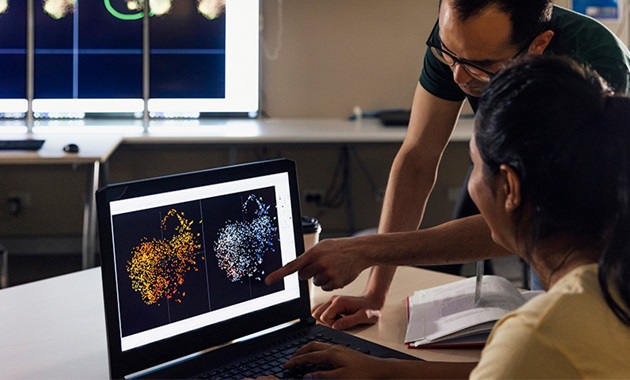Research is in integral part of the life of the School of Psychology. All staff are engaged in research, spanning a wide range of topics. The School of Psychology has five areas of research concentration, each having their own areas of specialisation.
Discover our research areas below, or see summary results of studies that you may have participated in. You'll also find information on the SONA Research Participation Portal for those conducting or participating in research projects.
Biological Psychology and Cognitive Neuroscience
Our key research areas include brain functional connectivity, neuroplasticity, and the effects of aging on cognitive and motor function. We aim to investigate the dynamic interactions between different brain regions, and how these interactions change over time and in response to different external and internal factors. Our research is informed by cutting-edge neurophysiological techniques, including electroencephalography (EEG), transcranial magnetic stimulation (TMS), and transcranial electrical stimulation (TES).
As a member of the Action and Cognition Research Group, you will have the opportunity to contribute to a vibrant and interdisciplinary research community, and to engage in cutting-edge research aimed at advancing our understanding of the underlying neural processes in health and disease. If you are passionate about psychology, neuroscience, and the study of human behaviour, and are looking for an intellectually stimulating and supportive research environment, we encourage you to consider joining us at the Action and Cognition Research Group.
The Pain Research Lab, led by Professor Peter Drummond and Dr Lechi Vo, is dedicated to exploring mechanisms underlying the experience of pain in healthy and chronic pain populations. We are interested in investigating the potential of non-invasive brain stimulation techniques to modulate pain, the role that psychosocial factors play in shaping pain perception, and the factors that contribute to healthy ageing and reduce chronic pain.
Our research is conducted using a multidisciplinary approach that combines psychophysical techniques, neurophysiological techniques, pupillometry and behavioural assessments to examine the neural mechanisms that underly pain modulation. Through our research, we hope to make a meaningful contribution to the field of pain modulation and pain management and improve the quality of life for individuals living with chronic pain.
Cognition and Perception
The Murdoch Music Cognition Laboratory at the School of Psychology is dedicated to advancing our understanding of the cognitive and neural processes underlying musical perception and cognition. Our research focuses on a range of topics, including the perception of pitch-temporal musical structure, the influence of mood on statistical learning of nonverbal material, the potential of music as an intervention for people with dementia, and the impact of music on mental imagery.
Under the leadership of Dr. Jon Prince, the lab is staffed by a team of researchers with diverse backgrounds and expertise. Our team is committed to using rigorous scientific methods to investigate the complex relationships between music and the human mind.
In addition to our internal research program, the Murdoch Music Cognition Laboratory is actively engaged in a number of collaborative projects with leading institutions, including the University of Western Sydney, Skidmore College, Macquarie University, the University of Toronto, and SUNY Buffalo. These partnerships allow us to bring together a range of perspectives and expertise to address some of the most pressing questions in the field.
The Perceptual Expertise Advanced Research Lab (The PEARL) at Murdoch University is focused on investigating ways to reduce error in safety-critical decision making, such as defence, forensics, and firefighting. Led by Dr. Matthew Thompson, our lab conducts research on the cognitive mechanisms underlying perceptual expertise, which is the ability to make accurate and efficient judgments based on visual information. Our research includes perceptual and behavioural studies to understand how experts process visual information differently from novices, as well as training studies to enhance expertise in real-world tasks.
Our lab is particularly interested in developing new methods to improve the accuracy and efficiency of decision-making in high-stakes domains, such as forensic identification, and target detection in complex environments. Our goal is to improve the performance of professionals who rely on visual information in their daily work and to enhance the quality and safety of important decisions. We have active research collaborations with The Department of Defence, The Department of Fire and Emergency Services, and every major Australian state and federal police agency.
Our research encompasses a variety of theoretical and methodological approaches, including Bayesian inference and theoretical psychology. We strive to advance our understanding of expertise through empirical research, and our work has been published in a wide range of high-impact journals. Our Lab collaborates with end-users and scholars in many disciplines such as psychology, cognitive science, education, computer science, neuroscience, sociology, and philosophy. Join us at The Expert Mind Lab to gain new insights into the nature of expertise and its development across a wide range of domains.
Developmental Psychology
The Child and Cognition in Autism Lab at Murdoch University is a lived-experience laboratory dedicated to understanding and improving learning and life outcomes in individuals with and without autism. Led by Dr. Shu Yau, our lab is unique in that we work closely with clinicians, families and teachers to co-design research projects that are tailored to the needs of children and families. We believe in a strengths-based approach to testing, which focuses on identifying and building on the strengths of individuals with autism, rather than focusing solely on deficits.
Our research projects are focused on understanding the cognitive and neural mechanisms underlying learning and development in children with autism. We use a variety of methods including behavioural testing, neuroimaging and eye-tracking to examine cognitive processes such as attention, memory, and language. Additionally, we also work closely with families, clinicians and teachers to translate our findings into practical interventions and strategies to improve learning and life outcomes for children with autism. Join us in our mission to improve the lives of individuals with autism and their families through innovative research and practice.
The Cognitive Development and Individual Differences Group at Murdoch University is dedicated to understanding the cognitive processes and mechanisms that underlie human development. Led by Associate Professor Helen Davis, our lab conducts research on a wide range of topics, including cognitive development, intelligence and individual differences, memory, and inhibition and information processing. We use a variety of methods, including behavioural experiments, neuroimaging, and computational modelling, to study these phenomena in both children and adults.
Our research aims to provide a deeper understanding of how the brain develops and changes across the lifespan, and how different cognitive abilities are related to each other. We also explore how environmental factors, such as parenting, education, and culture, influence cognitive development and how cognitive abilities are related to other aspects of development, such as social and emotional development. Our lab is open to undergraduate and graduate students who are interested in gaining research experience in the field of cognitive development, and we offer opportunities for students to participate in our ongoing research projects. Join us to explore the fascinating field of cognitive development.
Social and Organisational Psychology
The Evolved Psychology Research Lab is focused on investigating social phenomena through the lens of evolutionary and social psychology. Specifically, our research aims to provide a deeper understanding of how the extent of the mismatch behind our evolved psychology and modern environments can affect decision-making and behaviours. Led by Dr Amy J. Lim, our lab conducts research on a range of topics related to modern living, including – but not limited to - social media, low fertility rates, and pro-environmental behaviours.
Our research includes experimental studies to understand the causality of modern cues on human behaviours. We are particularly interested in revealing the underlying psychology that drives the decisions people make today as they navigate modern social environments. Ultimately, our goal is to apply our findings to real-world interventions to correct modern ills.
The group's research activities are focused on exploring key factors that impact performance in the workplace, including organisational change, leadership development, employee wellbeing, organizational culture and values, and employee motivation and engagement. Our team of experts use their expertise to deliver practical, relevant and innovative solutions to organisations, teams and individuals.
The WOP research group invites organisations to discuss their specific needs and interests with our team of endorsed organisational psychologists. We also welcome undergraduate and graduate students who are interested in gaining hands-on research experience in the field of organisational psychology. Join us as we work to uncover the complex dynamics of the modern workplace and develop evidence-based strategies to drive success and wellbeing in organisations and individuals alike.
The Qualitative Research in Psychology Group at Murdoch University aims to investigate psychological topics using research methodologies focused on qualitative data. Members of this research group are interested in deepening our understanding of the complexity and diversity of human experiences across a range of psychological topics, drawing on interpretivist and constructivist paradigms. Key group members are interested in social justice issues, particularly race and gender (Dr Brianne Hastie), health (Olivia Monson) and clinical psychology (Dr Lisa Young).
Our group is open to undergraduate and postgraduate students who are interested in gaining research experience with qualitative approaches, and we offer opportunities for students to participate in our ongoing research projects. We are also open to collaborating with industry groups and supporting community organisations with their qualitative research. Members use a range of data analysis, including discourse, thematic and narrative analyses, and discursive psychology. A variety of methods are used to collect data, including in-depth interviews, focus groups, observations, and analysis of media, social media, documents, and artifacts.
Likewise, a variety of research and data methods from different fields are applied, such as e.g. scale development for the valid and reliable measurement of complex latent variables (e.g. consumption behaviour or time wealth), assessment of their change over time in the course of behavioural interventions or uncovering how an individual’s behaviour is embedded in structural conditions using multi-level data modelling. Our lab welcomes undergraduate and graduate students who are interested in gaining research experience in the field of environmental psychology and want to contribute to a societal transformation where people care better for themselves, each other and the natural environment.
Mental Health
We have several ongoing projects, including the WA Memory Study and the 80 plus Study. By joining the Mental Health and Ageing Lab, you will complete your studies/projects and will also increase your abilities as a research associate trainee to undertake neuropsychological assessments on older adults, to participate in data collection, data analysis and even intervention delivery, wherever possible and appropriate.

